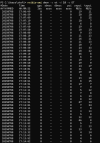Hello,
First of all I want to thank you for developing the tools, I've been using it for months and it's great. Today I updated to the latest beta branch and I noticed the new "PCIe Express Error Counters" that showed multiple errors. They were usually marked in red but by googling and searching for information on the forum, I've not really gotten a good answer at what exactly they mean and what causes them.
My current configuration, as the debug probably will already notify, is as follows:
MOBO: Asrock B650 Pro RS
CPU: Ryzen 7800X3D
GPU: RTX 5070 Ti
RAM: XPOWER Zenith Gaming 64 GB (2 x 32 GB) DDR5-6000 CL30
Storage: WD_BLACK 2TB SN770 NVME
PSU: NZXT C850
I'll attach the debug file generated after a 20+ minutes session while heavy gaming, in which I have not had any serious issue but I mean, I guess I shouldn't take lightly such serious issues when they appear.
I should also clarify that my 5070 Ti is negotiating PCIe Gen 5 x16 speed with 7800X3D own controller, even though the board does not officially support it. I might guess this is the issue, but I have really tested the PCIe speed and stability thoroughly and from benchmarking and gaming I've only attained benefits from using PCIe Gen 5 x16 speed, even if minor ones. Before trying to test if the errors arise even when using PCIe Gen 4 x16 speed, I'd like to be sure that the debug points to the GPU as the culprit for all the errors.
First of all I want to thank you for developing the tools, I've been using it for months and it's great. Today I updated to the latest beta branch and I noticed the new "PCIe Express Error Counters" that showed multiple errors. They were usually marked in red but by googling and searching for information on the forum, I've not really gotten a good answer at what exactly they mean and what causes them.
My current configuration, as the debug probably will already notify, is as follows:
MOBO: Asrock B650 Pro RS
CPU: Ryzen 7800X3D
GPU: RTX 5070 Ti
RAM: XPOWER Zenith Gaming 64 GB (2 x 32 GB) DDR5-6000 CL30
Storage: WD_BLACK 2TB SN770 NVME
PSU: NZXT C850
I'll attach the debug file generated after a 20+ minutes session while heavy gaming, in which I have not had any serious issue but I mean, I guess I shouldn't take lightly such serious issues when they appear.
I should also clarify that my 5070 Ti is negotiating PCIe Gen 5 x16 speed with 7800X3D own controller, even though the board does not officially support it. I might guess this is the issue, but I have really tested the PCIe speed and stability thoroughly and from benchmarking and gaming I've only attained benefits from using PCIe Gen 5 x16 speed, even if minor ones. Before trying to test if the errors arise even when using PCIe Gen 4 x16 speed, I'd like to be sure that the debug points to the GPU as the culprit for all the errors.
Attachments
Last edited:




